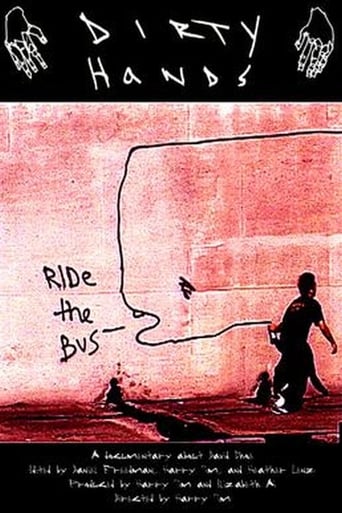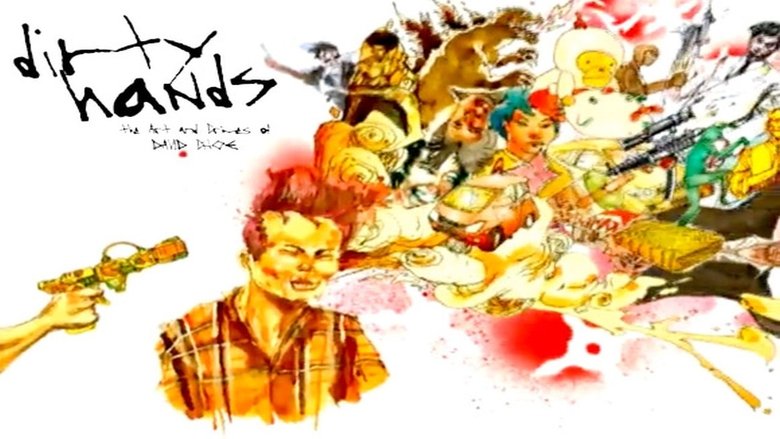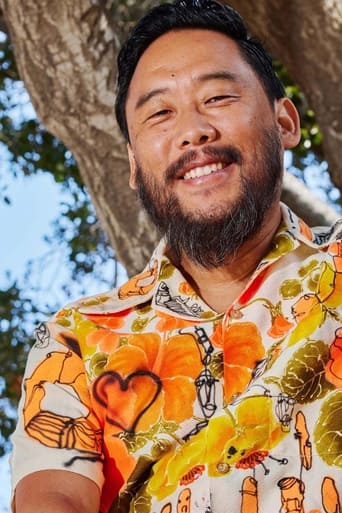

Dirty Hands: The Art & Crimes of David Choe (2008)
Los Angeles artist David Choe's kaleidoscopic work can be playful, confrontational and sexually frank. His personal life is no less complicated, as revealed by close friend Harry Kim, who documented Choe's life and crimes from 2000 to 2007. From the manic highs of commercial success and dinosaur hunting in the Congo to the self-destructive lows of Japanese jail sentences and bouts of self-doubt and depression, what begins as a gleeful portrait of a bad-boy artist slowly becomes a poignant celebration of one man's journey, both artistically and spiritually, toward his own uncertain salvation. Written by Travis Miles
Watch Trailer
Cast


Reviews
Cards on the table, biases laid bare: I loved 'David Choe: High Risk' for the same reasons I hate most documentaries.Before we dive into the actual subject matter – Choe, an American graffiti-artist of Korean descent who rose from rags to riches on the gamble of a lifetime – it's important to note that the subject matter in any documentary is secondary to its execution. We've got the likes of Michael Moore, who's objective is to bash you over the head with superior intellect, or Warner Herzog, who (despite his enchanting voice) can draw a few eye-rolls when he tries to wring water from the proverbial rock and find deep, fundamental meaning where there's none to be found. Either approach can come off as pretentious, and between not wanting to be verbally bashed by some fat guy and not trying to find the meaning of life in every little moment, I've my appetite for documentaries is lean at best.Generally, I need a flock of people telling me it changed their lives. That, or a guy stuffing himself on McDonald's for thirty days straight or otherwise self-abusing for my entertainment pleasure. The big names' styles just don't connect with me enough to take a risk.And then there's Harry Kim: unpretentious, honest, and intimately connected to his subject matter in a way these topic-hopping professionals could only dream of.Harry Kim is (and I hope remains) David Choe's best friend. Back when nobody gave two pence for what an unknown street artist was up to, Kim recognized the budding genius behind Choe's irreverent art. He spent ten years documenting Choe's life; living with him, accompanying him to the 'work site', and capturing over a decade those seemingly meaningless moments which provide the most intimate insight into Choe's life.The footage is often shaky. Grainy, low-quality. It's raw. It might have amounted to nothing.And in its edited version, 'High Risk', gave me goosebumps throughout. It wasn't some massive buildup for a single chilling quote at the end: High Risk, like its subject, is unrelenting.Eat your heart out, Herzog.David Choe's story is a rag-to-riches underdog tale. As a teen in LA he lived a delinquent but harmless life, diving into the graffiti scene and developing his early style, which could be best described as * irreverent * (were I to describe the vast majority of his art, it wouldn't pass any site's obscenity restrictions). His early start is typical of an aspiring artist, bashing his head against a wall with rejection after rejection, submitting a never ending stream of art to various magazines before discovering the lowest common denominator: uncensored sexuality.Illustrating for various porno's provided an outlet for Choe's obvious inner turmoil. Later in life he'd run the full gambit of 'troubled artist', even doing a stint in a Japanese prison for an assault on an officer, but even early on his art reflected a unique but dark mind. Kim, the documentarian, excelled in presenting this facet objectively, free of judgment, and for that I – as a fellow creative type with what some might consider a darker than average imagination – have to applaud him. These days there's a fine line between artistry and psychopathy, a subject upon which countless articles and times have already been penned; it's easy to examine weird, sometimes even upsetting art, and think the artist himself is violent or somehow mentally defective. Choe, undoubtedly, falls into that category of artist who may have turned to more extreme outlets but instead vents those emotions and thoughts into art that is sometimes offensive but always enthralling.There is however a potential criticism to be made that Kim, having been Choe's friend for so long, could not possibly have cut an objective portrayal. The evidence in High Risk is all to the contrary. Kim doesn't pull any punches, and while I'm sure he would have cut some content if Choe had asked him, he doesn't sugarcoat his subject. Some of the most entertaining and enlightening sequences are of Choe verbally riffing, displaying in oratory form his darkest fantasies. At one point while discussing his trial in Japan, he admits to fantasizing and even considering jumping the barrier between himself and a witness and 'murdering him in front of all those people', which – had Kim's aim been to soften Choe's ragged edges – certainly does Choe no favors.The narrative line Kim constructs from the chaos of a decade of struggle is the exact sort of story audiences can't get enough of. There's plenty of artifice in the rags-to-riches subgenre (one thinks of Drake, who supposedly 'started from the bottom' but in fact came from a comfortable Canadian suburb). Choe's story is the real deal, and if you doubt it, consider this: his career rocketed immediately following his incarceration in Japan, where he'd for months spiraled slowly into madness painting prison-art with * urine * and * soy-sauce *.Since it's presented at the documentary's opening, I'm not spoiling anything when I disclose Choe's artistic pinnacle. In fact, you've probably heard of him before.A small Silicon Valley startup hired Choe to paint their offices. They offered sixty-thousand dollars, or stock options.Choe took the stock options.That company was Facebook.Hundreds of millions of dollars and a single crushing victory could have been the pointed climax of this tale. But Kim doesn't sugarcoat anything: no amount of money would have made the story behind Choe.Kim gives you the full tale. He does it in an astoundingly brisk 45 minutes guaranteed to keep even the most inattentive viewer engaged. At times it's by the subject's own nature crass, but – like Choe's art – never needlessly so.But more than anything, the story and version of Choe which Kim gives us is raw, unvarnished, and all the more awe-inspiring for it.



